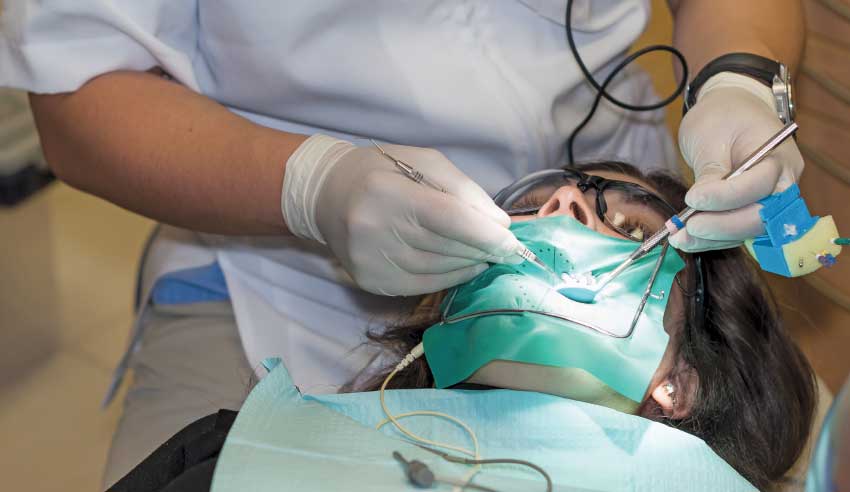Why See An Endodontist?
Find out how these dental specialists can help preserve your natural teeth
 |
If you have failing or missing teeth, there are some excellent tooth-replacement options. However, it's almost always better to save a natural tooth if at all possible. This is the focus of the dental specialty called endodontics.
An endodontist ("endo" – inside, "odont" – tooth) is a dentist who has advanced training in diagnosing and treating problems related to the soft tissue inside the tooth. These specialists perform routine as well as difficult and very complex procedures, including root canal treatment, retreatment and endodontic microsurgery. Having a root canal (which is done to remove infected and/or inflamed pulp tissue) often will relieve serious tooth pain right away, and can save a tooth that might otherwise need to be extracted.
Just as a medical doctor may specialize in a certain area of medicine, dentists can seek further training in specialties like surgery or children's dentistry. To become a specialist, endodontists must first complete the standard four years of dental school; next, they receive another two to three years of postgraduate training in the diagnosis and treatment of pain and diseases related to the living tissue at the center of the tooth (dental pulp) and its surrounding area.
The American Dental Association recognizes endodontics as one of nine dental specialties. And even though endodontists have the training to do regular dental procedures like fillings, they limit their practices to endodontic treatment and are licensed by the state where they practice.
Why See a Specialist?
Most people who experience tooth pain start by seeing their general dentist — and this is a good idea. The most common causes of toothaches are cavities and gum disease, and a general dentist is well-suited to treat these issues. However, lingering pain, extreme sensitivity to hot and cold, discomfort while chewing, or a dull ache in the jaw can all be indicative of an endodontic problem. An endodontist's specialized focus and training means that these specialists are highly skilled at diagnosing dental pain and treating associated disorders.
 |
| A root canal in a molar is more difficult because of longer roots and multiple canals, which often have accessory canals. Endodontists are specially trained to handle this type of situation. |
General dentists receive endodontic training in dental school, and some do endodontic procedures in their own practice; others refer all endodontic work to a specialist. Often, a general dentist will refer you to an endodontist if a condition presents particular challenges (such as confusing dental pain or a tooth with complex anatomy) and they feel seeing a specialist would benefit you.
When you go to see an endodontist, he or she will review your dental history and perform a thorough exam; diagnostic imaging and testing will be used help to identify the exact problem. After making a diagnosis, your endodontist will discuss the benefits, options, and risks involved, so you can understand how treatment can relieve your pain and save your tooth. If you decide to go ahead with endodontic treatment, it may start immediately and could even finish in one appointment.
Root Canals and Beyond
 |
A root canal is the most common procedure done by endodontists: They perform an average of twenty five root canals per week, which gives them a lot of clinical experience to draw on! In this procedure, the area is first anesthetized, and then a small hole is made in the crown (chewing surface) of the tooth. This provides access so that the affected tissue from inside the tooth can be removed. After a thorough cleaning, shaping and disinfection, the tooth is filled with a biocompatible material called gutta-percha, and sealed against re-infection; a crown (cap) is often needed, which your general dentist usually will place at a later appointment. Following a successful root canal and restoration, the tooth can be expected to function normally for many years.
Other treatments done by endodontists include:
- Endodontic retreatment which is needed when a previous root canal treatment fails or the tooth develops new problems.
- Saving a tooth that has been dislodged or completely knocked out of its socket because of trauma or injury. A dislodged tooth can be repositioned and possibly stabilized by splinting it to adjacent teeth, after which root canal therapy is done. The tooth can then heal and tighten in its socket.
- Endodontic surgery in cases where traditional root canal therapy cannot save a tooth. This includes procedures such as an apicoectomy, which is done to remove the apex (end) of the tooth root when the presence of calcium deposits or accessory canals would otherwise prevent a successful outcome.
Despite the outdated jokes you may have heard, endodontic procedures (especially in the hands of a skilled specialist) involve minimal or no pain. Endodontists use state-of-the-art equipment like ultrasonic instruments that operate via high frequency vibration, fiber optic illuminators, and advanced microscope technology to find disease deep inside the tooth. This allows them to work accurately and efficiently while keeping you as comfortable as possible.
If you have dental pain or endodontic concerns, you do not need to wait for a referral to an endodontist. Visit www.aae.org/find to find one in your area and contact his or her office directly. These specialists often are flexible about accommodating you in case of an emergency and may even see you the same day. Endodontists are committed to helping you keep your natural teeth — and with proper care, most teeth that have had endodontic treatment can last a very long time… even a lifetime.





